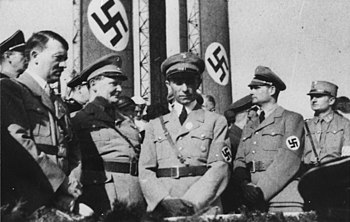 Imperial Eagle (Reichsadler), shield of the German Reich.  | |
| Date formed | 30 January 1933 |
| Date dissolved | 5 June 1945 |
| People and organisations | |
| Führer | Adolf Hitler (from August 1934 to April 1945) |
| Reichskanzler | Adolf Hitler |
| No. of ministers | 41 |
| Status in legislature | Großdeutscher Reichstag (until 1934, then used for meeting purposes) |
| History | |
| Elections | • March 1933 (8th Reichstag) • November 1933 (9th Reichstag) • 1934 referendum (merger of the positions of Chancellor and President) • March 1936 (10th Reichstag) • April 1938 (11th Reichstag) |
| Predecessor | Government of the Weimar Republic |
| Successor | Allied Control Council |
| Part of a series on |
| Nazism |
|---|
The government of Nazi Germany was a totalitarian dictatorship governed by Adolf Hitler and the Nazi Party according to the Führerprinzip. Nazi Germany was established in January 1933 with the appointment of Adolf Hitler as Chancellor of Germany, followed by suspension of basic rights with the Reichstag Fire Decree and the Enabling Act which gave Hitler's regime the power to pass and enforce laws without the involvement of the Reichstag or German president, and de facto ended with Germany's surrender in World War II on 8 May 1945 and de jure ended with the Berlin Declaration on 5 June 1945.
As the successor to the government of the Weimar Republic, it inherited the governmental structure and institutions of the previous state. Although the Weimar Constitution technically remained in effect until the German surrender, there were no actual restraints on the exercise of state power. In addition to the already extant Weimar government, the Nazi leadership created a large number of different organizations for the purpose of helping them govern and remain in power. They pursued a policy of rearmament and strengthened the Wehrmacht, established an extensive national security apparatus and created the Waffen-SS, the combat branch of the Schutzstaffel (SS).